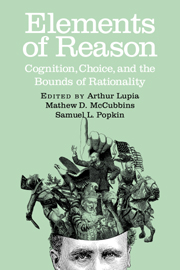Beyond Rationality: Reason and the Study of Politics
Published online by Cambridge University Press: 05 June 2012
Summary
A primary objective of social science is to explain why people do what they do. One of the great difficulties inherent in crafting such explanations is that we cannot observe the thoughts that precede a choice. As a result, social scientific explanations of individual behavior must be based on assumptions about the relationship between thinking and choosing – assumptions whose validity is not obvious.
In this volume, 18 scholars from a broad range of social scientific perspectives join together in an effort to craft better explanations of political behavior. Individually, each contributor argues that better explanations will come from paying closer attention to the relationship between thinking and choosing.
Collectively, our goal is to transform debates about the limits of rationality into more effective explanations of why people do what they do. Our attempt at such a transformation begins in this chapter, where we develop an alternative approach to the study of politics. Our approach combines a single, empirically sensible definition of rationality with an aggressive pursuit of how people seek and process information.
Our definition of rationality is motivated by the belief that scarcity is ubiquitous in political contexts. There are, for example, more ways to spend public funds than there are funds to spend, more ideas about what a society should do than there are opportunities for society to act, and so on. Time and energy are also scarce. As a result, people lack the time and energy to pursue all possible opportunities.
- Type
- Chapter
- Information
- Elements of ReasonCognition, Choice, and the Bounds of Rationality, pp. 1 - 20Publisher: Cambridge University PressPrint publication year: 2000
- 24
- Cited by



